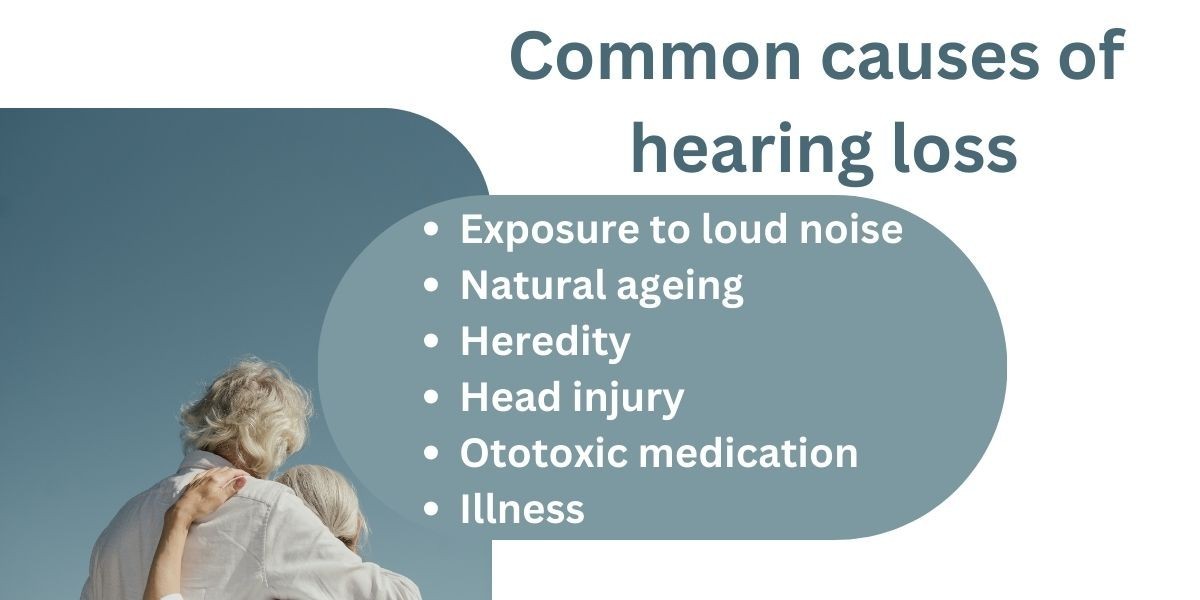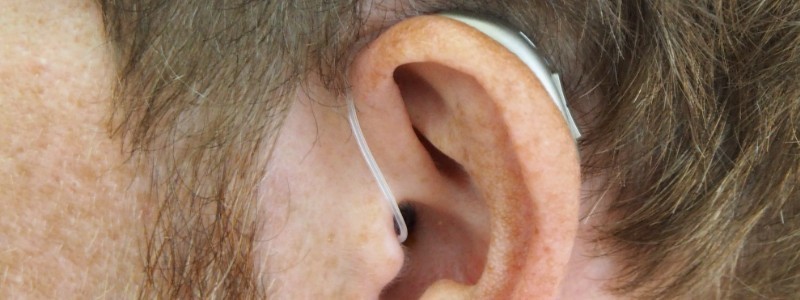Free home visits
with a local audiologist

Head of Online Medical Content

Audiology Expert at Hearing Aid UK

Introduction | Degrees of hearing loss | Causes | Symptoms | Types | Treatments | Resources | Living with bilateral hearing loss | Conclusion
Bilateral hearing loss refers to the reduction in hearing ability in both ears. It can be caused by factors such as ageing, exposure to loud noises, infections, or genetic conditions. However. it is normally due to the damage of the stereocilia, which are hair-like cells in the inner ear.
Treatments often require interventions like hearing aids or cochlear implants, depending on severity and type. Here we briefly discuss the symptoms, causes, treatments, types, and how to live with bilateral hearing loss.
If you have bilateral hearing loss it means both ears are affected. This type of hearing loss commonly occurs gradually over a long period of time. However, in some instances, it can be sudden, such as the result of too much exposure to loud noises.
How you experience and manage bilateral hearing loss will be different from the next person. For example, the hearing loss can be symmetrical, where the loss is the same severity in both ears or asymmetrical, where the loss is unbalanced. This means you'll hear better on one side.
This is why it is important to be seen by an audiologist if you suspect anything. They will test your hearing, analyse the severity, diagnose the loss, and tailor treatment to your specific needs.
Here are the degrees of hearing loss and what it means for you:

Genetics: What causes bilateral hearing loss? It is possible to be born with bilateral hearing loss as it can be inherited from either one or both parents.
Medications: There are some known medications that can be a trigger for developing bilateral hearing loss, such as ototoxic drugs which can cause damage to the ears.
Loud noise exposure: If you are exposed to loud noises over a long period of time it can cause temporary or permanent damage to your hearing.
Ageing: Presycusis, also known as age-related hearing loss, is the most common form of sensorineural hearing loss. This, in turn, is one of two forms of bilateral hearing loss, the other is conductive.
Ear infections and earwax: Continuous ear infections can cause blockages or structural damage to the ears. Similar to earwax buildup, which can also rupture the eardrum if accessive and left untreated.
What are the symptoms of bilateral hearing loss? It can sometimes be difficult to recognise symptoms of bilateral hearing loss, especially if it is gradual. However, if you do notice any change in your hearing, seek professional advice and support from an audiologist in your area.
Here are some common signs:
There are two types of bilateral hearing loss, these are sensorineural and conductive. In short, sensorineural hearing loss occurs when the tiny hair cells in the inner ear or the auditory nerve, which transmits sound to the brain, are damaged.
This type of hearing loss is typically caused by the natural ageing process or prolonged exposure to loud noises.
Conductive happens in the outer or middle ear, where sound is converted into vibrations and transmitted to the inner ear. When there's a blockage or other issue in these areas, sound waves may not effectively reach the inner ear.
Causes include excessive ear wax, a ruptured eardrum, or ear infections.

Modern hearing aids provide a natural hearing experience for those with bilateral hearing loss. Unlike older models that simply amplify sound, today's hearing aids send detailed sound signals to the brain, allowing for better hearing with less effort.
They significantly improve speech understanding and enhance the clarity and detail of surrounding sounds, creating a clearer listening environment.
For more severe cases, and you have experienced profound hearing loss from birth, cochlear implants are an excellent option. These electronic devices are surgically inserted into the inner ear and are a popular solution.
They work by replacing the damaged nerves responsible for sending electrical signals to the brain.
If you suffer from bilateral hearing loss, you might not consider yourself disabled. However, if your hearing loss is severe or profound, you may be eligible for disability benefits and grants, depending on the extent of the damage.
These resources can assist with daily life, offering support through specialist technologies, assistive devices, and in-person help, enabling you to communicate more effectively - either at home or in the workplace.
Find out more by visiting the RNID website at www.rnid.org.uk, or download the NHS whitepaper on bilateral hearing loss by clicking on the green button further down the page.
Living with bilateral hearing loss can be challenging, but today's technology makes it easier. Modern hearing aids and cochlear implants offer clear, detailed sound, enhancing everyday interactions.
Support from loved ones and hearing professionals are also invaluable parts of future hearing health. While adjustments are needed, staying active, social, and engaged helps maintain a fulfilling life despite hearing challenges.
Bilateral hearing loss is the reduction of hearing in both ears, caused by ageing, loud noise exposure, infections, or genetics.
Symptoms include relying on lipreading, asking for repetitions, and difficulty hearing in noisy environments.
There are two types:
Sensorineural and conductive, treatments include modern hearing aids and cochlear implants, which enhance sound clarity and speech understanding.
Audiologists provide tailored care, essential for managing this condition.
 I have difficulty hearing in noisy places
I have difficulty hearing in noisy places  High-Pitched Sounds Like Birdsong Are Fading. Do I Have Hearing Loss?
High-Pitched Sounds Like Birdsong Are Fading. Do I Have Hearing Loss?  Asking people to repeat themselves frequently. Do I have hearing loss?
Asking people to repeat themselves frequently. Do I have hearing loss? Do not spend hundreds of pounds without getting a second opinion from us.
 Not only are the prices great, but the service is fantastic! Many thanks to your team.
Not only are the prices great, but the service is fantastic! Many thanks to your team.If you are looking at this page then it is likely that an audiologist has suggested that you purchase this particular hearing aid, so is this the best model for you?
In general, any audiologist will always recommend to you the model that best suits your needs. Here is a useful checklist to make sure that is the case.
If in doubt, feel free to give us a call. That's what we're here for. In the meantime, read all about our review of the best hearing aids for 2025 here
If you have significant hearing loss in both ears, you should be wearing two hearing aids. Here are the audiological reasons why:
Localisation: The brain decodes information from both ears and compares and contrasts them. By analysing the minuscule time delays as well as the difference in the loudness of each sound reaching the ears, the person is able to accurately locate a sound source. Simply put, if you have better hearing on one side than the other, you can't accurately tell what direction sounds are coming from.
Less amplification is required: A phenomenon known as “binaural summation” means that the hearing aids can be set at a lower and more natural volume setting than if you wore only one hearing aid.
Head shadow effect: High frequencies, the part of your hearing that gives clarity and meaning to speech sounds, cannot bend around your head. Only low frequencies can. Therefore if someone is talking on your unaided side you are likely to hear that they are speaking, but be unable to tell what they have said.
Noise reduction: The brain has its own built-in noise reduction which is only really effective when it is receiving information from both ears. If only one ear is aided, even with the best hearing aid in the world, it will be difficult for you to hear in background noise as your brain is trying to retain all of the sounds (including background noise) rather than filtering it out.
Sound quality: We are designed to hear in stereo. Only hearing from one side sounds a lot less natural to us.
Fancy some further reading on this topic? You can read about why two hearing aids are better than one in our article, hearing aids for both ears, here
For most people, the main benefit of a rechargeable hearing aid is simple convenience. We are used to plugging in our phones and other devices overnight for them to charge up. Here are some other pros and cons:
For anybody with poor dexterity or issues with their fingers, having a rechargeable aid makes a huge difference as normal hearing aid batteries are quite small and some people find them fiddly to change.
One downside is that if you forget to charge your hearing aid, then it is a problem that can't be instantly fixed. For most a 30-minute charge will get you at least two or three hours of hearing, but if you are the type of person who is likely to forget to plug them in regularly then you're probably better off with standard batteries.
Rechargeable aids are also a little bit bigger and are only available in Behind the Ear models.
Finally, just like with a mobile phone, the amount of charge you get on day one is not going to be the same as you get a few years down the line. Be sure to ask what the policy is with the manufacturer warranty when it comes to replacing the battery.
Looking for more information on rechargeable hearing aids? Read our dedicated page on the topic here
For most people, the answer is yes. But it's never that simple.
The majority of hearing problems affect the high frequencies a lot more than the low ones. Therefore open fitting hearing aids sound a lot more natural and ones that block your ears up can make your own voice sound like you are talking with your head in a bucket. Therefore in-ear aids tend to be less natural.
However the true answer is we can't tell until we have had a look in your ears to assess the size of your ear canal, and until we have tested your hearing to see which frequencies are being affected.
People with wider ear canals tend to have more flexibility, also there are open fitting modular CIC hearing aids now that do not block your ears.
There is also the age old rule to consider, that a hearing aid will not help you if it's sat in the drawer gathering dust. If the only hearing aid you would be happy wearing is one that people can't see, then that's what you should get.
Most people can adapt to any type of hearing aid, as long as they know what to expect. Have an honest conversation with your audiologist as to what your needs are.
Generally speaking, six or more. Unless it's none at all.
The number of channels a hearing aid has is often a simplistic way an audiologist will use to explain why one hearing aid is better than another, but channels are complex and it is really not that straightforward. Here are some reasons why:
Hearing aids amplify sounds of different frequencies by different amounts. Most people have lost more high frequencies than low and therefore need more amplification in the high frequencies. The range of sounds you hear are split into frequency bands or channels and the hearing aids are set to provide the right amount of hearing at each frequency level.
Less than six channels and this cannot be done with much accuracy, so six is the magic number. However, a six channel aid is typically very basic with few other features and is suitable only for hearing a single speaker in a quiet room. The number of channels is not what you should be looking at, it's more the rest of the technology that comes with them.
As a final note, different manufacturers have different approaches. One method is not necessarily better than any other. For example, some manufacturers have as many as 64 channels in their top aids. Most tend to have between 17 and 20. One manufacturer has no channels at all.
Hearing aids are easily lost, misplaced or damaged and typically are one of the most expensive personal possessions an individual can own. We offer hearing aid warranty coverage for £80 per year per aid. Find out more about this service we provide here
All our audiologists use the very latest technology and provide the full range of tests to accurately measure your hearing for free. Find out about what hearing healthcare services we offer all our customers here
Hearing Aid UK offers all their customers free home visiting services, even in a care home environment, for no extra cost. Including hearing tests, fittings, maintenance, check-ups and much more in the comfort of your own home and at your convenience. Find out more information about our home visits here
Here, at Hearing Aid UK, we are dedicated to offering low hearing aid prices. We achieve this by having no head office and low marketing costs. Our hearing aid prices are amongst the lowest you will find anywhere in the world. Explore our prices, brands, and models here
When we refer to a product as 'Latest Launch', we mean it is the latest to be released on the market.
When we refer to a product as 'New', we mean that the product is the newest hearing aid model on the market.
When we refer to a product as 'Superseded', we mean that there is a newer range available which replaces and improves on this product.
When we refer to a product as an 'Older Model', we mean that it is has been superseded by at least two more recent hearing aid ranges.